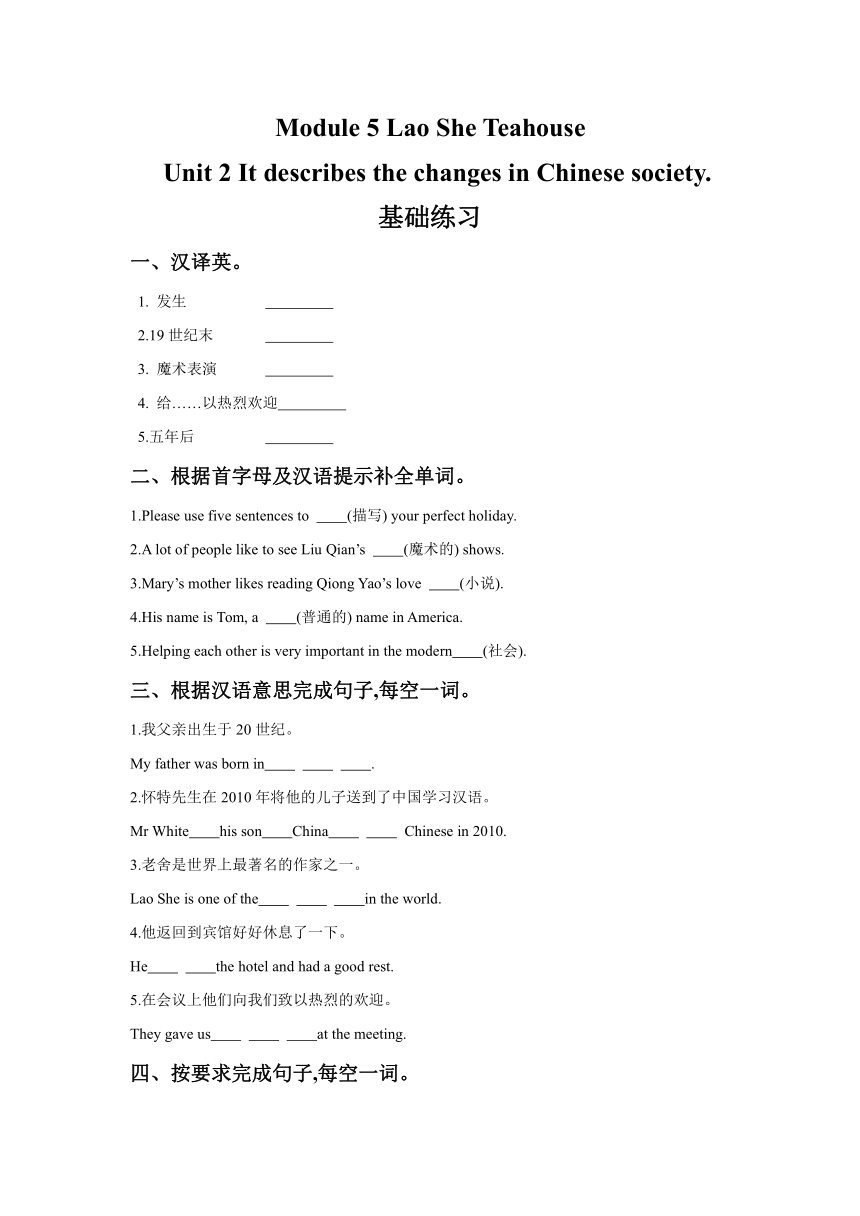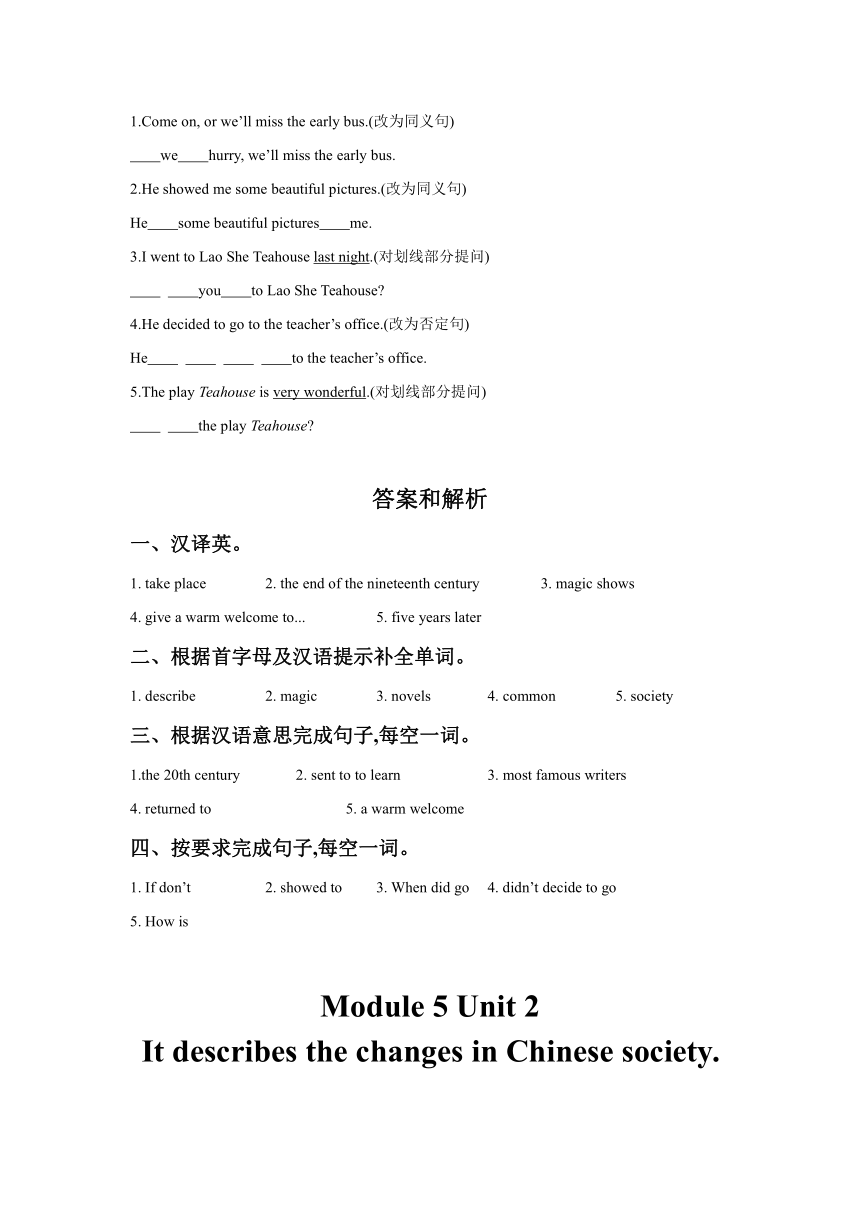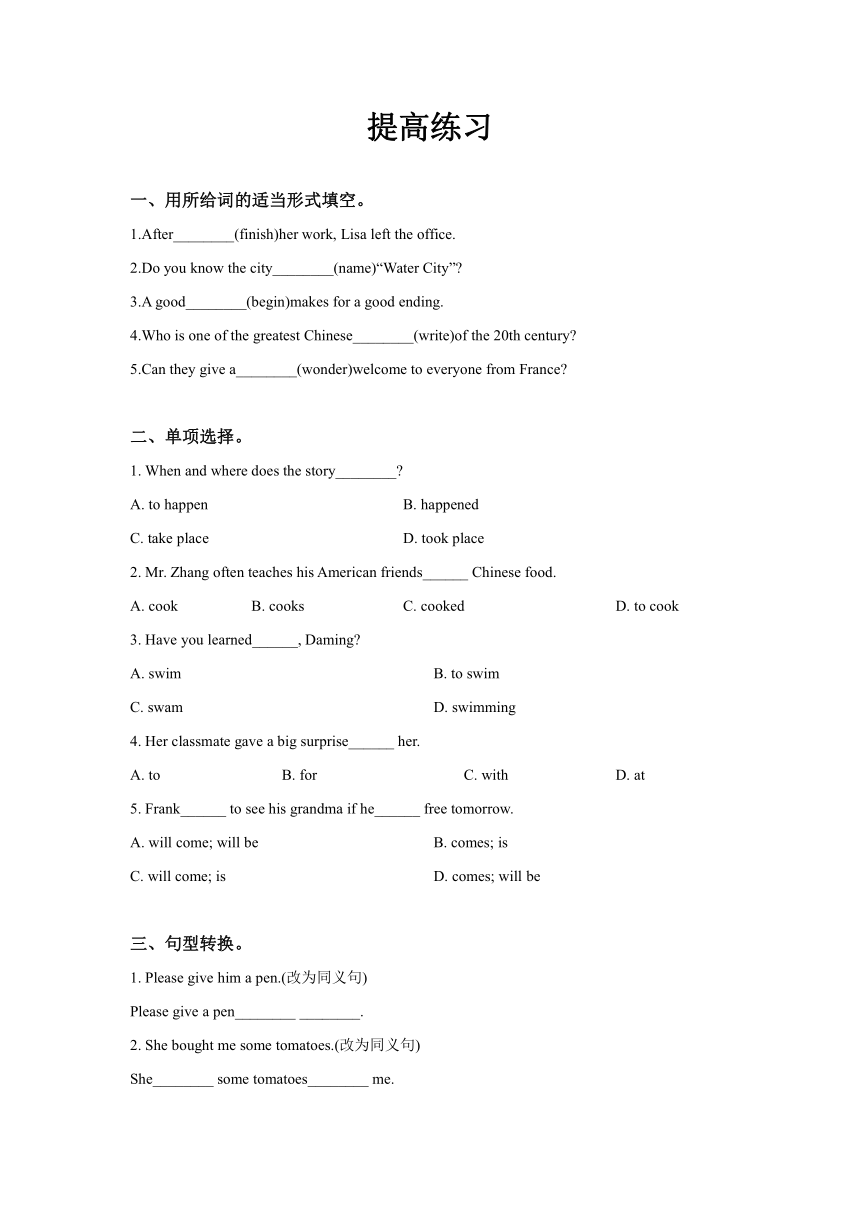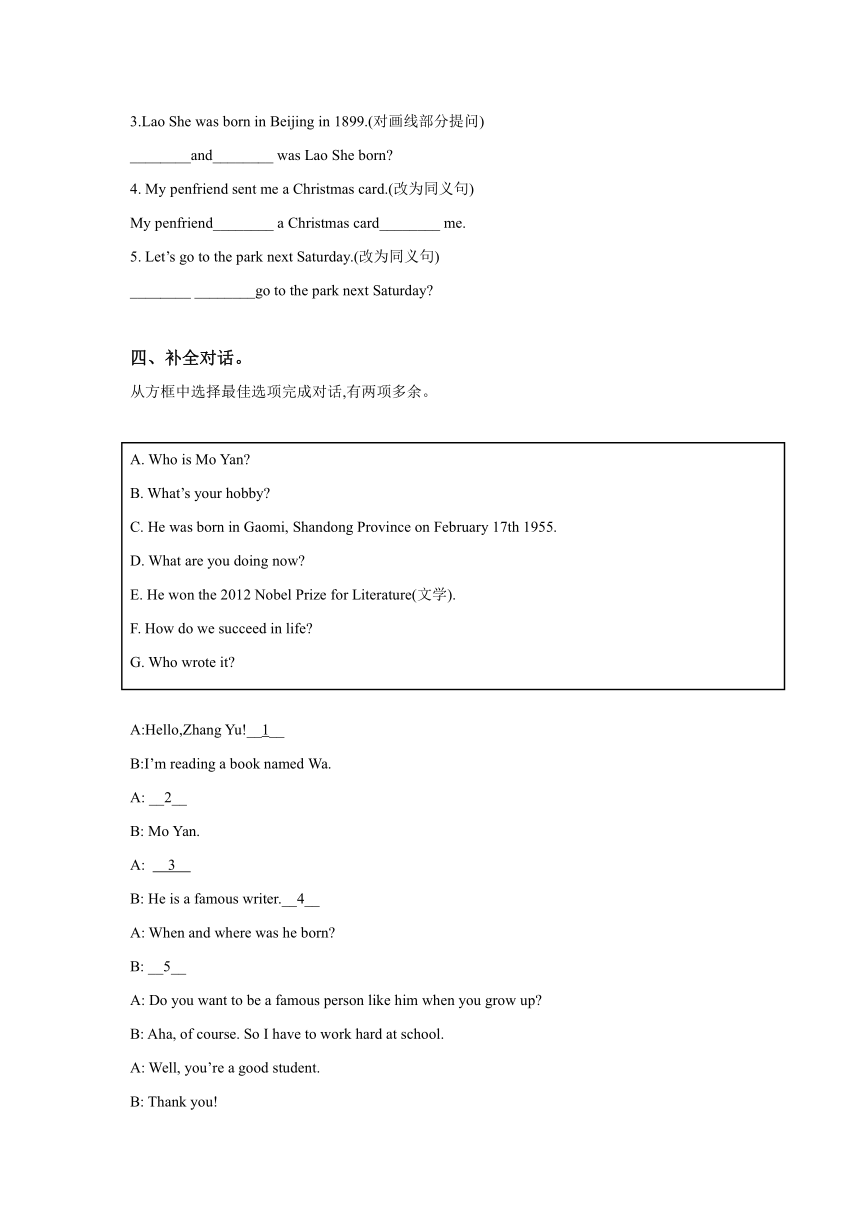Module 5 Lao She Teahouse Unit 2 It describes the changes in Chinese society 同步练习(含答案)
文档属性
| 名称 | Module 5 Lao She Teahouse Unit 2 It describes the changes in Chinese society 同步练习(含答案) |

|
|
| 格式 | zip | ||
| 文件大小 | 15.3KB | ||
| 资源类型 | 教案 | ||
| 版本资源 | 外研版 | ||
| 科目 | 英语 | ||
| 更新时间 | 2019-07-13 17:41:02 | ||
图片预览




文档简介
Module 5 Lao She Teahouse
Unit 2 It describes the changes in Chinese society.
基础练习
一、汉译英。
1. 发生 ? ?
2.19世纪末 ? ?
3. 魔术表演 ? ?
4. 给……以热烈欢迎 ? ?
5.五年后 ? ?
二、根据首字母及汉语提示补全单词。
1.Please use five sentences to (描写) your perfect holiday.?
2.A lot of people like to see Liu Qian’s (魔术的) shows.?
3.Mary’s mother likes reading Qiong Yao’s love (小说).?
4.His name is Tom, a (普通的) name in America.?
5.Helping each other is very important in the modern (社会).?
三、根据汉语意思完成句子,每空一词。
1.我父亲出生于20世纪。
My father was born in .?
2.怀特先生在2010年将他的儿子送到了中国学习汉语。
Mr White his son China Chinese in 2010.?
3.老舍是世界上最著名的作家之一。
Lao She is one of the in the world.?
4.他返回到宾馆好好休息了一下。
He the hotel and had a good rest.?
5.在会议上他们向我们致以热烈的欢迎。
They gave us at the meeting.?
四、按要求完成句子,每空一词。
1.Come on, or we’ll miss the early bus.(改为同义句)
we hurry, we’ll miss the early bus.?
2.He showed me some beautiful pictures.(改为同义句)
He some beautiful pictures me.?
3.I went to Lao She Teahouse last night.(对划线部分提问)?
you to Lao She Teahouse??
4.He decided to go to the teacher’s office.(改为否定句)
He to the teacher’s office.?
5.The play Teahouse is very wonderful.(对划线部分提问)?
the play Teahouse??
答案和解析
一、汉译英。
1. take place 2. the end of the nineteenth century 3. magic shows
4. give a warm welcome to... 5. five years later
二、根据首字母及汉语提示补全单词。
1. describe 2. magic 3. novels 4. common 5. society
三、根据汉语意思完成句子,每空一词。
1.the 20th century 2. sent to to learn 3. most famous writers
4. returned to 5. a warm welcome
四、按要求完成句子,每空一词。
1. If don’t 2. showed to 3. When did go 4. didn’t decide to go
5. How is
Module 5 Unit 2
It describes the changes in Chinese society.
提高练习
一、用所给词的适当形式填空。
1.After________(finish)her work, Lisa left the office.
2.Do you know the city________(name)“Water City”?
3.A good________(begin)makes for a good ending.
4.Who is one of the greatest Chinese________(write)of the 20th century?
5.Can they give a________(wonder)welcome to everyone from France?
二、单项选择。
1. When and where does the story________?
A. to happen B. happened
C. take place D. took place
2. Mr. Zhang often teaches his American friends______ Chinese food.
A. cook B. cooks C. cooked D. to cook
3. Have you learned______, Daming?
A. swim B. to swim
C. swam D. swimming
4. Her classmate gave a big surprise______ her.
A. to B. for C. with D. at
5. Frank______ to see his grandma if he______ free tomorrow.
A. will come; will be B. comes; is
C. will come; is D. comes; will be
三、句型转换。
1. Please give him a pen.(改为同义句)
Please give a pen________ ________.
2. She bought me some tomatoes.(改为同义句)
She________ some tomatoes________ me.
3.Lao She was born in Beijing in 1899.(对画线部分提问)
________and________ was Lao She born?
4. My penfriend sent me a Christmas card.(改为同义句)
My penfriend________ a Christmas card________ me.
5. Let’s go to the park next Saturday.(改为同义句)
________ ________go to the park next Saturday?
四、补全对话。
从方框中选择最佳选项完成对话,有两项多余。
A. Who is Mo Yan?
B. What’s your hobby?
C. He was born in Gaomi, Shandong Province on February 17th 1955.
D. What are you doing now?
E. He won the 2012 Nobel Prize for Literature(文学).
F. How do we succeed in life?
G. Who wrote it?
A:Hello,Zhang Yu!__1__
B:I’m reading a book named Wa.
A: __2__
B: Mo Yan.
A: 3 ?
B: He is a famous writer.__4__
A: When and where was he born?
B: __5__
A: Do you want to be a famous person like him when you grow up?
B: Aha, of course. So I have to work hard at school.
A: Well, you’re a good student.
B: Thank you!
1.______2.______3.______4.______5.______
答案和解析
一、用所给词的适当形式填空。
1. finishing 2. named 3. beginning 4. writers 5. wonderful
二、单项选择。
1. C 【解析】从助动词does可以看出,该句时态是一般现在时,用does表示出了三单式,后面的行为动词要恢复原形。
2. D 【解析】teach sb.to do sth.意为“教某人做某事”。
3.B 【解析】learn to do sth.意为“学习做某事”。
4. B 【解析】从题意可知,她的同班同学给了她一个大大的惊喜。故选B。
5. C 【解析】以if引导的条件状语从句中,主句和从句的时态遵循“主将从现”的原则。
三、句型转换。
1. to him 2. bought for 3. When where 4. sent to 5. Why not
四、补全对话。
1. D 2. G 3. A 4. E 5. C
Module 5 Unit 2
It describes the changes in Chinese society.
培优练习
一、单项填空。
( )1.I live in a tall building and my house is on floor.?
A. twenty B. the twenty
C. twentieth D. the twentieth
( )2. Even the simplest food will taste delicious it is prepared with love. ?
A. though B. if
C. so D. but
( )3. His father is talking the teacher his son’s English. ?
A. with; with B. about; about
C. with; about D. about; with
( )4. —What did Mr Green say to his son?
— He told him . ?
A. didn’t smoke B. don’t smoke
C. not to smoke D. not smoke
( )5. I’ll take my sister to the museum if it this afternoon. ?
A. rain B. rains
C. doesn’t rain D. won’t rain
二、补全对话。
A:Lily, what did you do last night?
B:I went to Xinghai Square.
A:1. ?
B:I watched some shows there with my parents.
A:What show did you watch?
B:2. ?
A:Really?Do you like the Beijing Opera?
B:Not bad. But my parents like it very much. 3. ?
A:By the way, what kind of music do you like best?
B:4. And Zhou Jielun is my favourite singer. ?
A:5. Do you want to watch it??
B:Yes, of course. I plan to go to the concert, and I hope to see Zhou Jielun.
A. We watched the Beijing Opera.
B. I like pop music very much.
C. What did you do there?
D. Zhou Jielun is a famous singer.
E. Sometimes they even like singing some of the Beijing Opera.
F. We watched a football match.
G. There will be a Zhou Jielun’s concert next week.
三、完形填空。
Not long ago, I made up my mind to read a lot of books to get more knowledge. So I went to the library and 1 home happily with some books. But after a few days, I felt impatient. The 2 of finishing all of them seemed impossible, because I always found it 3 to calm down to read a whole book. I didn’t know how to do with it. Then 4 one day I thought of “Why not make reading interesting?” This idea gave me 5 again. ?
Reading is a journey of spirit(精神). Every time we read a book, we are actually talking 6 the writer. I tried to put all my effort(努力) into his or her books, 7 I could feel all of his or her happiness and sadness. Now books have become a part of my life. ?
See? Attitude(态度) can make a great 8 . Someone once said, “Even though the situation is bad, people still have one freedom to 9 their attitude. ” So, don’t complain about study or work. It helps 10 . Try to see things from a different way. Believe me, this will change the situation and help you a lot. ?
( )1. A. sang B. jumped
C. returned D. danced
( )2. A. way B. habit
C. advice D. idea
( )3. A. hard B. interesting
C. happy D. easy
( )4. A. sadly B. quickly
C. suddenly D. hardly
( )5. A. advice B. hope
C. time D. knowledge
( )6. A. with B. about
C. of D. at
( )7. A. because B. although
C. but D. so
( )8. A. decision B. difference
C. discussion D. promise
( )9. A. paint B. choose
C. show D. hide
( )10. A. nothing B. anything
C. everything D. something
四、 任务型阅读。
When you see kung fu films, you see people run on walls or even fly. Do you ever want to be like them? Maybe you can tell yourself, “I could do that only in my dreams. ”
But at kung fu schools around the country, many kids like you are trying to make those dreams come true.
Beijing Shaolin Wushu School is just one of these schools. Thousands of students from 4 to 19 years old go there to learn kung fu.
But when students begin to study kung fu, they quickly learn that flying is not so easy.
In the morning, the students at Beijing Shaolin Wushu School learn things like English and maths. They learn kung fu in the afternoon. There are more classes in the evening. They have to get up at 6∶00 am and go to bed at 10∶00 pm.
“I feel like I never get enough sleep, ” said Wang Xinwen, a 15-year-old girl. “Many of my classmates fall asleep in class. ”
But the hardest part is the kung fu exercise. Teachers make the students work hard. When students don’t do well, teachers will hit them with a stick.
1.How old are the students at Beijing Shaolin Wushu School?(不超过10个词)
2.What do students do in the morning at Beijing Shaolin Wushu School?(不超过10个词)
3.What will teachers do when students don’t do well?(不超过10个词)
答案和解析
一、单项填空。
1. D 【解析】在几层楼,应该用序数词表达;序数词前一般要加定冠词the。
2. B 【解析】从句意看,这是一个条件状语从句,故用if引出。
3.C 【解析】talk with sb.意为“和某人交谈”;talk about sth.意为“谈论某事情”。
4. C 【解析】tell sb.not to do sth.意为“告诉某人不要做某事”。
5. C 【解析】从语法上判断,以if引导的条件状语从句应用一般现在时;从意义上判断,此处应用否定形式。
二、补全对话。
1. C 2.A 3. E 4.B 5. G
三、完形填空。
1. C 【解析】从前半句可知,我去图书馆,借了一些书高兴地回到家中。
2. D 【解析】读完所有书的主意看起来是不可能的。
3.A 【解析】因为我总是发现,静下心来阅读整本书很困难。
4. C 【解析】然后,突然有一天我想到,“为什么不让阅读变得有趣呢?”
5. B 【解析】这个主意再次给了我希望。
6. A 【解析】talk with sb.意为“和某人交谈”。
7. D 【解析】从整句来看,前半句和后半句是因果关系,故用so表达。
8.B 【解析】态度可以导致很大的改变。
9. B 【解析】即便情况很糟糕,人们仍然有选择他们态度的自由。
10. A 【解析】从上一句可以看出,不要抱怨自己的学习和工作,那于事无补。
四、 任务型阅读。
1. They are from 4 to 19 years old.?
2. Students learn things like English and maths.?
3. Teachers will hit them with a stick.?
Unit 2 It describes the changes in Chinese society.
基础练习
一、汉译英。
1. 发生 ? ?
2.19世纪末 ? ?
3. 魔术表演 ? ?
4. 给……以热烈欢迎 ? ?
5.五年后 ? ?
二、根据首字母及汉语提示补全单词。
1.Please use five sentences to (描写) your perfect holiday.?
2.A lot of people like to see Liu Qian’s (魔术的) shows.?
3.Mary’s mother likes reading Qiong Yao’s love (小说).?
4.His name is Tom, a (普通的) name in America.?
5.Helping each other is very important in the modern (社会).?
三、根据汉语意思完成句子,每空一词。
1.我父亲出生于20世纪。
My father was born in .?
2.怀特先生在2010年将他的儿子送到了中国学习汉语。
Mr White his son China Chinese in 2010.?
3.老舍是世界上最著名的作家之一。
Lao She is one of the in the world.?
4.他返回到宾馆好好休息了一下。
He the hotel and had a good rest.?
5.在会议上他们向我们致以热烈的欢迎。
They gave us at the meeting.?
四、按要求完成句子,每空一词。
1.Come on, or we’ll miss the early bus.(改为同义句)
we hurry, we’ll miss the early bus.?
2.He showed me some beautiful pictures.(改为同义句)
He some beautiful pictures me.?
3.I went to Lao She Teahouse last night.(对划线部分提问)?
you to Lao She Teahouse??
4.He decided to go to the teacher’s office.(改为否定句)
He to the teacher’s office.?
5.The play Teahouse is very wonderful.(对划线部分提问)?
the play Teahouse??
答案和解析
一、汉译英。
1. take place 2. the end of the nineteenth century 3. magic shows
4. give a warm welcome to... 5. five years later
二、根据首字母及汉语提示补全单词。
1. describe 2. magic 3. novels 4. common 5. society
三、根据汉语意思完成句子,每空一词。
1.the 20th century 2. sent to to learn 3. most famous writers
4. returned to 5. a warm welcome
四、按要求完成句子,每空一词。
1. If don’t 2. showed to 3. When did go 4. didn’t decide to go
5. How is
Module 5 Unit 2
It describes the changes in Chinese society.
提高练习
一、用所给词的适当形式填空。
1.After________(finish)her work, Lisa left the office.
2.Do you know the city________(name)“Water City”?
3.A good________(begin)makes for a good ending.
4.Who is one of the greatest Chinese________(write)of the 20th century?
5.Can they give a________(wonder)welcome to everyone from France?
二、单项选择。
1. When and where does the story________?
A. to happen B. happened
C. take place D. took place
2. Mr. Zhang often teaches his American friends______ Chinese food.
A. cook B. cooks C. cooked D. to cook
3. Have you learned______, Daming?
A. swim B. to swim
C. swam D. swimming
4. Her classmate gave a big surprise______ her.
A. to B. for C. with D. at
5. Frank______ to see his grandma if he______ free tomorrow.
A. will come; will be B. comes; is
C. will come; is D. comes; will be
三、句型转换。
1. Please give him a pen.(改为同义句)
Please give a pen________ ________.
2. She bought me some tomatoes.(改为同义句)
She________ some tomatoes________ me.
3.Lao She was born in Beijing in 1899.(对画线部分提问)
________and________ was Lao She born?
4. My penfriend sent me a Christmas card.(改为同义句)
My penfriend________ a Christmas card________ me.
5. Let’s go to the park next Saturday.(改为同义句)
________ ________go to the park next Saturday?
四、补全对话。
从方框中选择最佳选项完成对话,有两项多余。
A. Who is Mo Yan?
B. What’s your hobby?
C. He was born in Gaomi, Shandong Province on February 17th 1955.
D. What are you doing now?
E. He won the 2012 Nobel Prize for Literature(文学).
F. How do we succeed in life?
G. Who wrote it?
A:Hello,Zhang Yu!__1__
B:I’m reading a book named Wa.
A: __2__
B: Mo Yan.
A: 3 ?
B: He is a famous writer.__4__
A: When and where was he born?
B: __5__
A: Do you want to be a famous person like him when you grow up?
B: Aha, of course. So I have to work hard at school.
A: Well, you’re a good student.
B: Thank you!
1.______2.______3.______4.______5.______
答案和解析
一、用所给词的适当形式填空。
1. finishing 2. named 3. beginning 4. writers 5. wonderful
二、单项选择。
1. C 【解析】从助动词does可以看出,该句时态是一般现在时,用does表示出了三单式,后面的行为动词要恢复原形。
2. D 【解析】teach sb.to do sth.意为“教某人做某事”。
3.B 【解析】learn to do sth.意为“学习做某事”。
4. B 【解析】从题意可知,她的同班同学给了她一个大大的惊喜。故选B。
5. C 【解析】以if引导的条件状语从句中,主句和从句的时态遵循“主将从现”的原则。
三、句型转换。
1. to him 2. bought for 3. When where 4. sent to 5. Why not
四、补全对话。
1. D 2. G 3. A 4. E 5. C
Module 5 Unit 2
It describes the changes in Chinese society.
培优练习
一、单项填空。
( )1.I live in a tall building and my house is on floor.?
A. twenty B. the twenty
C. twentieth D. the twentieth
( )2. Even the simplest food will taste delicious it is prepared with love. ?
A. though B. if
C. so D. but
( )3. His father is talking the teacher his son’s English. ?
A. with; with B. about; about
C. with; about D. about; with
( )4. —What did Mr Green say to his son?
— He told him . ?
A. didn’t smoke B. don’t smoke
C. not to smoke D. not smoke
( )5. I’ll take my sister to the museum if it this afternoon. ?
A. rain B. rains
C. doesn’t rain D. won’t rain
二、补全对话。
A:Lily, what did you do last night?
B:I went to Xinghai Square.
A:1. ?
B:I watched some shows there with my parents.
A:What show did you watch?
B:2. ?
A:Really?Do you like the Beijing Opera?
B:Not bad. But my parents like it very much. 3. ?
A:By the way, what kind of music do you like best?
B:4. And Zhou Jielun is my favourite singer. ?
A:5. Do you want to watch it??
B:Yes, of course. I plan to go to the concert, and I hope to see Zhou Jielun.
A. We watched the Beijing Opera.
B. I like pop music very much.
C. What did you do there?
D. Zhou Jielun is a famous singer.
E. Sometimes they even like singing some of the Beijing Opera.
F. We watched a football match.
G. There will be a Zhou Jielun’s concert next week.
三、完形填空。
Not long ago, I made up my mind to read a lot of books to get more knowledge. So I went to the library and 1 home happily with some books. But after a few days, I felt impatient. The 2 of finishing all of them seemed impossible, because I always found it 3 to calm down to read a whole book. I didn’t know how to do with it. Then 4 one day I thought of “Why not make reading interesting?” This idea gave me 5 again. ?
Reading is a journey of spirit(精神). Every time we read a book, we are actually talking 6 the writer. I tried to put all my effort(努力) into his or her books, 7 I could feel all of his or her happiness and sadness. Now books have become a part of my life. ?
See? Attitude(态度) can make a great 8 . Someone once said, “Even though the situation is bad, people still have one freedom to 9 their attitude. ” So, don’t complain about study or work. It helps 10 . Try to see things from a different way. Believe me, this will change the situation and help you a lot. ?
( )1. A. sang B. jumped
C. returned D. danced
( )2. A. way B. habit
C. advice D. idea
( )3. A. hard B. interesting
C. happy D. easy
( )4. A. sadly B. quickly
C. suddenly D. hardly
( )5. A. advice B. hope
C. time D. knowledge
( )6. A. with B. about
C. of D. at
( )7. A. because B. although
C. but D. so
( )8. A. decision B. difference
C. discussion D. promise
( )9. A. paint B. choose
C. show D. hide
( )10. A. nothing B. anything
C. everything D. something
四、 任务型阅读。
When you see kung fu films, you see people run on walls or even fly. Do you ever want to be like them? Maybe you can tell yourself, “I could do that only in my dreams. ”
But at kung fu schools around the country, many kids like you are trying to make those dreams come true.
Beijing Shaolin Wushu School is just one of these schools. Thousands of students from 4 to 19 years old go there to learn kung fu.
But when students begin to study kung fu, they quickly learn that flying is not so easy.
In the morning, the students at Beijing Shaolin Wushu School learn things like English and maths. They learn kung fu in the afternoon. There are more classes in the evening. They have to get up at 6∶00 am and go to bed at 10∶00 pm.
“I feel like I never get enough sleep, ” said Wang Xinwen, a 15-year-old girl. “Many of my classmates fall asleep in class. ”
But the hardest part is the kung fu exercise. Teachers make the students work hard. When students don’t do well, teachers will hit them with a stick.
1.How old are the students at Beijing Shaolin Wushu School?(不超过10个词)
2.What do students do in the morning at Beijing Shaolin Wushu School?(不超过10个词)
3.What will teachers do when students don’t do well?(不超过10个词)
答案和解析
一、单项填空。
1. D 【解析】在几层楼,应该用序数词表达;序数词前一般要加定冠词the。
2. B 【解析】从句意看,这是一个条件状语从句,故用if引出。
3.C 【解析】talk with sb.意为“和某人交谈”;talk about sth.意为“谈论某事情”。
4. C 【解析】tell sb.not to do sth.意为“告诉某人不要做某事”。
5. C 【解析】从语法上判断,以if引导的条件状语从句应用一般现在时;从意义上判断,此处应用否定形式。
二、补全对话。
1. C 2.A 3. E 4.B 5. G
三、完形填空。
1. C 【解析】从前半句可知,我去图书馆,借了一些书高兴地回到家中。
2. D 【解析】读完所有书的主意看起来是不可能的。
3.A 【解析】因为我总是发现,静下心来阅读整本书很困难。
4. C 【解析】然后,突然有一天我想到,“为什么不让阅读变得有趣呢?”
5. B 【解析】这个主意再次给了我希望。
6. A 【解析】talk with sb.意为“和某人交谈”。
7. D 【解析】从整句来看,前半句和后半句是因果关系,故用so表达。
8.B 【解析】态度可以导致很大的改变。
9. B 【解析】即便情况很糟糕,人们仍然有选择他们态度的自由。
10. A 【解析】从上一句可以看出,不要抱怨自己的学习和工作,那于事无补。
四、 任务型阅读。
1. They are from 4 to 19 years old.?
2. Students learn things like English and maths.?
3. Teachers will hit them with a stick.?
同课章节目录
- Module 1 How to learn English
- Unit 1 Let's try to speak English as much as possi
- Unit 2 You should smile at her.
- Unit 3 Language in use .
- Module 2 My home town and my country
- Unit 1 It's taller than many other buildings.
- Unit 2 Cambridge is a beautiful city in the east o
- Unit 3 Language in use .
- Module 3 Sports.
- Unit 1 Nothing is more exciting than playing tenni
- Unit 2 This year we training more carefully.
- Unit 3 Language in use .
- Module 4 Planes, ships and trains .
- Unit 1 He lives the farthest from school.
- Unit 2 What is the best way to travel.
- Unit 3 Language in use .
- Module 5 Lao She Teahouse.
- Unit 1 I wanted to see the Beijing Opera.
- Unit 2 It descibes the changes in Chinese society.
- Unit 3 Language in use .
- Module 6 Animals in danger.
- Unit 1 It allows people to get closer to them .
- Unit 2 The WWF is working hard to save them all.
- Unit 3 Language in use .
- Revision module A
- Module 7 A famous story
- Unit 1 Alice was sitting with her sister by the ri
- Unit 2 She was thinking about her cat.
- Unit 3 Language in use .
- Module 8 Accidents
- Unit 1 While the car were changing to red, a car s
- Unit 2 I was trying to pick it up when it bite me
- Unit 3 Language in use .
- Module 9 Population
- Unit 1 The population of China is about 1.37 billi
- Unit 2 Arnwick was a city with 200,000 people.
- Unit 3 Language in use .
- Module 10 The weathe
- Unit 1 It might snow.
- Unit 2 The weather is fine all year round.
- Unit 3 Language in use .
- Module 11 Way of life
- Unit 1 In China ,we open a gift later.
- Unit 2 In England, you usually drink tea with milk
- Unit 3 Language in use .
- Module 12 Help
- Unit 1 What should we do before help arrives?
- Unit 2 Stay away from windows and heavy furniture.
- Unit 3 Language in use .
- Revision module B
